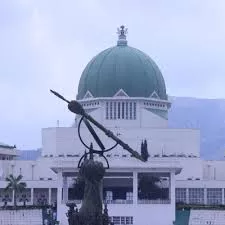
NATIONAL ASSEMBLY CONSIDERS BILL TO RETURN NIGERIA TO REGIONAL GOVT
A bill proposing a return to regional government in Nigeria is before the National Assembly and is expected to passed into law before October 1, 2024.
Part of the draft bill circulating on social media, seen by SaharaReporters is titled: “A Bill for an Act to Substitute the Annexure to Decree 24 of 1999 with a New Governance Model for the Federal Republic of Nigeria.”
Although the identities of the sponsors of the bill were yet to be ascertained, the Bill when passed would be cited as the Constitution of the Federal Republic of Nigeria New Governance Model for Nigeria Act 2024.
The sponsors of the Bill explained that the current Constitution of the Federal Republic of Nigeria 1999 (as Amended) is not “autochthonous” as it does not evolve from the deliberations and consensus of the Nigerian people.
According to the advocates, the constitution amendment would be subject to a “yes or no” vote in a referendum by the people of the Federal Republic of Nigeria.
Part of the draft Bill read:
“PART I – Preliminaries: WHEREAS Nigeria, its Peoples and Government have been governed under Decree 24 of 1999 that was handed down by the then Military Government without the express consent of the people despite the preamble of “We the people.”
“WHEREAS the said Constitution of the Federal Republic of Nigeria 1999 (as Amended) is not autochthonous as it does not evolve from the deliberations and consensus of the Nigerian People.
“WHEREAS the Peoples of Nigeria now desire and effectively demand for a change to a Constitution based on Federal/Regional System of Government.
“WHEREAS the Federal and Regional governments are to operate within the provisions of this Constitution, it is within the discretion of the ethnic blocs within the States that constitutes a given region to aggregate or disaggregate as Provinces, Divisions and Districts, while being in control of their affairs without let or hindrance at whatever level of governance.
“Whereas the 1999 Constitution as amended is a schedule of a military decree now deemed to be an Act of the National Assembly for which the National Assembly have the powers to amend and/or abrogate as expedient.
“Whereas the National Assembly where so necessary and expedient can invoke the doctrine of necessity to resolve any point of law for the good governance of the country Nigeria.”
On PART 11 – Substitution Clause, the drafters proposed that the National Assembly shall invoke its inherent powers to expunge the schedule attached to decree 24 of 1999 often referred to as 1999 Constitution as amended from the decree, which “is now deemed to be an Act of the National Assembly to which the National Assembly have the powers to so do and replace same with a new governance model for Nigeria effective not later than October 1, 2024.”
“This amendment is subject to a yes or no vote in a Referendum by the people of the Federal Republic of Nigeria,” it proposed.
On governance structure under PART III – Stipulations for Federal Administration, the sponsors proposed that: “(1) Nigeria shall be a Federation comprising of Regional Territories and a Federal Capital Territory and shall be a Republic to be known by the name of the Federal Republic of Nigeria.
“(2) The territorial jurisdiction of Nigeria shall comprise the territory of the Regional members of the Federation and its boundaries shall be as determined by international agreements
“3.2 Basis of the Federation: “(1) Every Ethnic Nationality and People in Nigeria has an unconditional right to self-determination within here delineated territories.
“(2) The sovereignty, powers and authority to formulate the articles of association towards any reform of the Central Federal Government of Nigeria, at any other time shall lie jointly and severally with all the ethnic nationalities occupying their respective territories.
“(3) Every Ethnic Nationality and People in Nigeria has the right to a full measure of self-government which includes the right to establish institutions of government in the territory that it inhabits and to equitable representation in the Federal and Regional Governments.”(4) A “Ethnic Nationality or People” for the purpose of this Constitution, is a group of people who have or share large measure of a common culture or similar customs, mutual intelligibility of language, belief in a common or related identities, a common psychological make-up, and who inhabit.”

